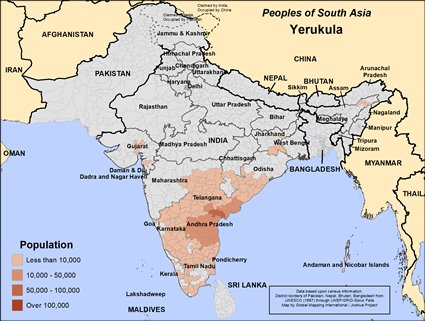Yerukula in India

Photo Source:
Anonymous
|

Map Source:
People Group data: Omid. Map geography: UNESCO / GMI. Map Design: Joshua Project.
|
| People Name: | Yerukula |
| Country: | India |
| 10/40 Window: | Yes |
| Population: | 558,000 |
| World Population: | 558,000 |
| Primary Language: | Telugu |
| Primary Religion: | Hinduism |
| Christian Adherents: | 1.77 % |
| Evangelicals: | 0.00 % |
| Scripture: | Complete Bible |
| Ministry Resources: | Yes |
| Jesus Film: | Yes |
| Audio Recordings: | Yes |
| People Cluster: | South Asia Tribal - other |
| Affinity Bloc: | South Asian Peoples |
| Progress Level: |
|
Introduction / History
Yerukala people are a tribe found largely in the southern Indian states of Andhra Pradesh, Tamil Nadu and Karnataka. Yerukala are an indigenous people which means they have low status in modern India. They are called Yerukula after their women's traditional profession of fortune telling. This people have a language of its own, Yerukula. Many of them also speak Telugu and Hindi so they can communicate with those outside their group. A small fraction of the Yerukala claim to be followers of Jesus Christ.
What Are Their Lives Like?
The traditional occupations of Yerukala include basket-making, mat weaving, raising pigs and chicken and rope-making. The Yerukala women are specialized in fortune telling and making charms. Today, most of the Yerukala are settled in villages or towns. They are trying to make their way out of poverty by getting an education. Even though they live in a democratic country like India, they are still living under harsh social conditions because of the Hindu caste system. They face daily social and economic discrimination. The sub-divisions of Yerukula include those who make baskets from split bamboo, those who make items from wild date leaves, those who make weaver's combs, and sellers of curry leaves and salt. Most of them live in nuclear families. Descent is along the father's line, and authority comes from his line as well. They prefer cross-cousin marriages. Their marriages are usually between one man and one woman, but they do allow a man to have more than one wife if he can afford it. Marriage through negotiation and exchange are the common modes of acquiring mates. Divorce is permissible on the grounds of adultery, barrenness and incompatibility between the spouses. Widows are permitted to re-marry. The Yerukala tribe has its own social control mechanism to ensure proper observance of prescribed codes of conduct. This traditional council is headed by an elderly man whose office is hereditary. The traditional tribal council decides the domestic disputes and enforces social norms.
What Are Their Beliefs?
The Yerukala practice Hinduism, the ancient religion of India. Their brand of Hinduism is heavily influenced by folk religion. They worship and serve the gods of the Hindu pantheon. Hindus believe that by performing rituals and good works that they will attain "moksha" or freedom from the endless cycle of birth, death and rebirth. The Yerukala visit Hindu shrines and offer prayers, food, flowers, and incense to their gods in hopes of gaining protection and benefits. They do not have a personal or familial relationship with their gods as Christians do. There are many forms of Hinduism, each with its own deities and beliefs. The main yearly holidays of the Yerukala people are Holi, the festival of colors and the start of spring, Diwali, the festival of lights, Navratri, the celebration of autumn and Rama Navami, Rama's birthday. The caste system divides Hindus into four main categories. The lowest communities are outside of the caste system. As a tribal people the Yerukala are outside the Hindu caste system.
What Are Their Needs?
The Yerukula people need to put all their trust in Jesus Christ. He alone can forgive their sins and free them from their fear of evil spirits. They also need to learn new job skills and good local schools for their children.
Prayer Points
Ask the Lord to give the Yerukala a desire to investigate the Person and claims of Jesus Christ.
Pray for a disciple making movement among the Yerukala people this decade.
Pray for the Lord to send workers to the Yerukala people to tell them about Jesus and to help them with their physical needs.